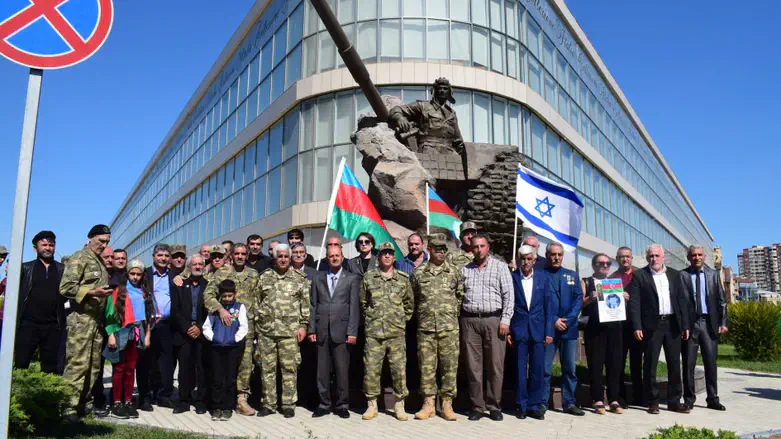
Azerbaijan, a Muslim country, is sending a Jewish singer to the Eurovision Song Contest. Roman Gurevich, the Jewish Agency's honorary envoy to his native Azerbaijan, speaks about the situation of the Jewish community in the country, which, despite its proximity to Iran, has chosen an independent and sympathetic policy toward Israel.
Gurevich talks about the singer, a young man named Assaf Mishayev, a Jew from the mountainous region of Azerbaijan, and a singer in a Jewish band, who in the past participated in and won a song competition of the ‘mountain’ Jews and now teaches singing to Jewish children and teenagers. He adds that that this is not a random incident or a lack of knowledge on the part of the Azerbaijani population, but rather a famous singer whose Jewishness is well-known.
Gurevich sees the incident as further evidence of the tolerance that Azerbaijan has managed to maintain for centuries, even when pressured by other Muslim countries, led by Iran. "For centuries in Jewish history, Azerbaijan has never been antisemitic. This is perhaps the only country in the world, apart from Israel of course, that has an entire town of Jews. Before the Communist Revolution, the town was called 'The Jewish Town,' but the Communists changed its name to 'The Red Town.'"
As someone who grew up in Azerbaijan, Gurevich is convinced that anyone like him, who lives there, can attest to the special attitude that Jews receive there, as well as the friendship between the various communities. According to him, Jewish and Israeli tourists will become acquainted with the special Jewish cultural elements, alongside landscapes that combine snow-capped mountains, deserts and even fire that comes out of the ground.
Gurevich talks about the Jewish holidays, when members of the community send gifts to their Muslim neighbors and also receive gifts from their neighbors on Muslim holidays.
As mentioned, Iran does not like this relationship between its neighbor and Israel and the Jews, and exerts quite intense pressure to sever this connection. Gurevich says that Iran has also attempted to send radical Islamists to Azerbaijan to inflame the situation there, "but the government knows how to protect the country, its citizens and the character that is almost non-existent in the modern world, a character of respect for all religions."
Another example of this special relationship is the statue of a Jewish soldier named Albert Agarunov in a square in Baku, the capital. Agarunov became a national hero when he fought and fell in the war, when Armenia invaded Azerbaijan. At the soldier's funeral, the family asked that after the recitation of the Kaddish, a Jewish prayer in memory of the deceased, a Muslim prayer from a local mufti be included.
Gurevich says that there are about 40,000 Jews In Azerbaijan who are given special treatment. "The President says that tolerance is a gift from heaven for us, which must be preserved and treated accordingly. The Azerbaijanis are renovating a mosque and for the grand opening, the President has invited the Chief Rabbi of Azerbaijan, Christian leaders, together with Muslim leaders and representatives of other religions from more distant areas. In the presence of the country's leadership, they will speak together at the ceremony and then return to their communities and relate what they saw. That's how it works."
"After the October 7th massacre, when we saw that the world had turned against us, ordinary citizens in Azerbaijan brought flowers and candles to the Embassy and placed Israeli and Azerbaijani flags there. The Turks demanded that they act against Israeli interests, but they have managed to maintain ties with Turkey and embrace us as a people within Azerbaijan, and as the independent state of Israel. This is an amazing situation that needs to be preserved."